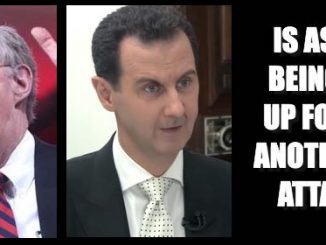
Assad 180: Will Trump prove to be no better than Hillary Clinton in Syria?
MARTIN JAY
FILE PHOTO: Republican U.S. presidential nominee Donald Trump listens to Democratic nominee Hillary Clinton © Rick Wilking / Reuters
Barely has the ink had time to dry on the newsprint which condemned Syria’s president as the culprit behind the chemical attack in Idlib. With the Western media bereft of any hard evidence, we appear to be seeing a change in Donald Trump’s candor and perhaps perspective toward Assad with the US strike on a military base.
The attack for many signals a sea change – from Obama’s previous ‘Assad must go’ mantra – which was eclipsed by Trump’s more pragmatic approach to the Syrian conflict.
This is the problem of Western media bias over not only Syria. No Western journalists are pointing out the irony and audacity of Trump, who is appalled by the chemical attack, but not affected by the hundreds of civilians being buried alive in Mosul by US bombing. Or, for that matter, the brazen double standards of America and its brain-washed media which refuses to explain to the public that US forces have used white phosphorus in Syria when hitting ISIS.
That same blind dogma is contagious. Britain’s bungling foreign minister, Boris Johnson, was also happy, along with France’s President Hollande (who called for new sanctions against Assad) to indulge himself with unsubstantiated reports in the British press about Assad being the culprit for the chemical attacks.
The question remains though, after the Idlib chemical attacks and the airstrikes against Assad’s military base in Homs, will this thin-skinned president do a full 180-degree change in his policy toward Assad and revert to Obama’s doctrine? Or were the strikes a one-shot PR gift horse which he couldn’t resist?
Recent changes in his administration, ranging from the outing of Lt. Gen. Michael Flynn after only three weeks in office, to the more recent removal of Steve Bannon from the National Security Council, hasn’t made him look like he has a firm grip on matters. Rather, he seems to be floundering. If you just take a gander at his big Middle East objectives, it’s a similar story of failing to deliver. His bold new policy with Israel to shift the location of the US embassy has fizzled out, his promises to tear up the Iran deal have turned out to be threats from a paper tiger, and his ISIS campaign in Mosul is nothing short of a disaster.
Trump badly needs a Middle East initiative which brings him positive press coverage and feeds his febrile need for attention, in a period where his ratings have hit a record low mark. It may well be Obama’s so-called ‘red line’ in Syria which could be the basis of a new strategy there, given that his previous ‘safe zones’ plan seems to have been shot out of the sky.
Assad allowed UN weapons inspectors into Syria, who had not only had taken the regime’s remaining stocks of chemical weapons but, as Joshua Landis of the Center for Middle East Studies told RT, went further to implement a three-year moratorium (from 2013 to 2016) on chemical attacks.
US presidents seldom disturb ME policy
If we are to believe Western media claims, that the Assad government carried out such an attack, then Trump must be facing a quandary which will no doubt irk him, given his repulsion of the Obama administration and his unfettered determination to distinguish himself from it. Ironically, it was Trump’s arrival in office as president which appears to have been the catalyst for the use of chemical weapons, delivering a double blow of humiliation given how Trump mocks Obama’s so-called ‘red lines.’ For three years though, those red lines seemed to have meant something to President Assad.
Few US Presidents since Jimmy Carter have managed to make any real radical changes in US foreign policy in the region. And it’s as though both the Iranians and Assad in Syria banked on that.
But the argument for Assad using chemical weapons in Idlib is shaky, at best. And again, it is the shameful tunnel vision of Western media and its rancid bias toward Assad that obliterates inconvenient truths which sit awkwardly with the narrative that Assad is the root of the problem in Syria and cannot be part of a solution. Few geopolitical experts I have spoken to can understand why Assad, at this stage in the Syrian war, would do such a callous and illogical act, for which he cannot profit. On the very cusp of negotiations going on all around the world, with many EU governments starting to open dialogue with him, it would seem insane to carry out such an attack which would ostracize him once again.
There are other inconvenient truths about the Idlib attack which the Western media don’t want to explore. High numbers of so-called ‘White Helmet’ workers there were reportedly given just one month before the attacks protective clothing against nerve gas attacks. But even more telling is the jaded Western viewpoint on how it both views and investigates claims from the Syrian regime about chemical weapons in the hands of extremists. Sources close to the Syrian government camped in Beirut have informed me that Damascus informed the UN “weeks ago” that it knew of nerve gas being smuggled into Idlib from Turkey and now in the hands of Nusra fighters there, but whose exact whereabouts are unknown. Was this information taken seriously? Is this perhaps why the UN is the only agency at present which is taking its time before making broad sweeping statements?
I can’t help remembering the words of former Guardian journalist David Rose, who when asked by John Pilger in a TV documentary how much responsibility he and others took for not holding Tony Blair more to account over cooked ‘evidence’ on WMDs in Iraq, Rose replied solemnly, “if we had been doing our jobs, there wouldn’t have been a war.”
It seems now that the job of journalists is to report ‘alternative facts’ which provoke Western leaders toward the battlefield once again. Trump will be fair game.
************
ER recommends other articles by RT
About the author
Martin Jay is an award winning British journalist now based in Beirut who works on a freelance basis for a number of respected British newspapers as well as previously Al Jazeera and Deutsche Welle TV. Before Lebanon, he has worked in Africa and Europe for CNN, Euronews, CNBC, BBC, Sunday Times and Reuters. Follow him on Twitter @MartinRJay





